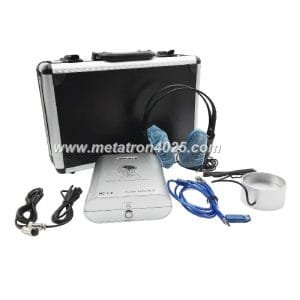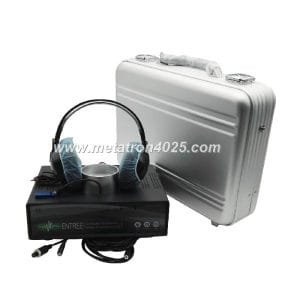High tech 3d upgraded version NLS 4025 Hunter Body Analyser Machine
Demande maintenant!





Taper:Aides à l'examen clinique
Marque:TONGQUAN
Numéro de modèle:TQ-518D
Lieu d'origine:Guangdong, Chine (Continent)
Systems NLS Body Health Analyzer:2015 New Style HUNTER NLS Nonlinear System Analyzer
Système d'exploitation:Fenêtre XP,vue de la fenêtre,window 7,window 8
Langue:Anglais ,Allemand,russe
Pack color:Sliver
Fonction:Fonction
Chasseur 4025 NLS system:Oberon system
OEM:Oui
Poids:7kg
Certificat:CE
garantie:Un ans
High tech 3d upgraded version NLS 4025 Hunter Body Analyser Machine
Détail rapide:
The Institute of Practical Psychophysics introduces new version of HSS “Metatron” with “Red Dragon”software adapted for Eastern Asia markets.
While having all principal functions of “Metapathia GR Clinical” software “Red Dragon” software includes
some additional features:
– In addition to Russian, English and German languages the new software supports Chinese and Japanese languages.
– New section – “Traditional Chinese Medicine preparations” containing more than 600 etalons was added to “Red Dragon” software.
Chinese medicine is technology for health resumption which contributed greatly into development of world medicine. The main distinctive feature of these traditional preparations which are used and perfected for thousand years is that they are made of natural components only. From the point of view of physiology Traditional Chinese Medicine preparations are more natural and thus safer and more helpful for human health than chemically synthesized drugs of the Western medicine.
Description:
Les recherches de l'Institut ont créé un système d'investigation sans analogique, qui permet de retracer toutes les conditions dans le corps grâce aux changements dans les caractéristiques des ondes des tissus du corps. Systèmes d'analyse non linéaires (NLS) sont les technologies de l’information les plus avancées disponibles au cours de ce siècle et peuvent être considérées comme la réalisation la plus remarquable et la plus avantageuse des sciences naturelles modernes.. L'équipement de diagnostic est basé sur l'analyse spectrale du champ magnétique vortex de tout objet biologique. C’est tout à fait unique et sans précédent dans le monde aujourd’hui.
Le système matériel-logiciel « METATRON » développé à l'Institut de Psychophysique Pratique permet de produire une activité bioélectrique prédéfinie des neurones du cerveau, avec cette activité en arrière-plan, il devient possible d'amplifier sélectivement des signaux difficilement détectables par rapport aux fluctuations statistiques, puis isoler et décoder les informations qu'ils contiennent.
Le système « METATRON » relève en quelque sorte ce rayonnement là où il provient pour ensuite le décoder et l'afficher sur l'écran de l'ordinateur où est réalisé un modèle virtuel de l'organe dans des couleurs spécifiques..
Les modèles informatiques donnent également aux médecins une projection tridimensionnelle des organes internes. Les marques colorées placées sur l'image permettent au médecin de déterminer plus facilement le site du processus pathologique.. Il est possible de juger du processus de désintégration de ces structures biologiques, et faire un pronostic, en comparant la gamme de couleurs des marques et leur disposition sur le modèle informatique de l'orgue, en utilisant la dynamique de leur changement sur une période de temps.
Afin de définir la pathologie dans une zone, il est nécessaire d'étudier les niveaux plus profonds de l'organe produit sur l'écran par l'ordinateur jusqu'à ce que le nidus pathologique soit localisé..
Les recherches de l'Institut ont réussi à produire cet équipement le plus efficace, capable de s'accorder automatiquement sur la fréquence des impulsions maîtresses sans intervention humaine., ainsi que, détecter et corriger lui-même les défauts et pathologies des organes et des cellules du corps. Ceci est réalisé grâce à la combinaison de différentes oscillations magnétiques spécifiquement modulées enregistrées sur une matrice.. Le concept fondamental dans le développement de cet équipement était l'hypothèse selon laquelle le corps humain dispose d'un cadre d'information électromagnétique capable de répondre aux rayonnements externes..
Avantages des fonctionnalités:
1. Le chasseur 4025 est plus automatiquement.
2. Hunter vous donnera une comparaison après avoir effectué l'analyse et la thérapie..
3. Hunter vous donnera des recherches plus approfondies pour une raison profonde.
4. Hunter vous donnera des recommandations sur le traitement du candidat.
5. Hunter peut vous offrir une plus grande précision.
6. Le Hunter est plus professionnel et intelligent.
7. Hunter peut tester tout votre corps selon le système humain., which can help you save time to choose item.
8. Hunter peut faire le test des méridiens.
9. Le logiciel de Hunter est plus adapté à l'utilisation, lorsque vous déplacez la souris sur l'icône, il vous donnera une description de la fonction du bouton.
10. Le médecin peut ajouter un nidus plus précis lors des tests.
11. There is a “smart filter” function, il peut transmettre les éléments qui ne conviennent pas au candidat, et laisser les éléments qui conviennent au candidat.
Accessories:
| Machine principale | 1 PC |
| Capteur de casque | 1 PC |
| Câble USB bleu 1 PC | 1 PC |
| Câble de connexion noir de haute qualité | 2 PC |
| Coupe d'essai 1 PC | 1 PC |
| Doodle USB pour logiciel | 1 PC |
| Logiciel DVD | 1 PC |
| Boîte en aluminium | 1 PC |
Avantage compétitif:
1.Nous sommes fabricant Metatron 4025 NLS
2.2015 derniers produits
3.Taux de précision allant jusqu'à 95%
4.2-an de garantie (un an sur la base de l'augmentation du montant initial)
5.Femmes enceintes, les enfants et les personnes âgées peuvent l'utiliser sans aucun effet secondaire
6.Emballage en aluminium robuste résistant aux chocs à haute température.
How to use the DIACOM-NLS software?








UN:OPERATIONAL PROCEDURE WITH THE PROGRAM “DIACOM-NLS”
1. To find on the working table of computer mark “DIACOM-NLS”, twice to click on the
small square with the pointer by the left key for mouse.
2. So that the program would be opened, apparatus must be connected into the network and
the head sets they must be on the head in doctor-operator or in patient.
3. The title page of program is opened. After checking of Soma- ports is applied the mouse
pointer to the key THE RECEPTION OF PATIENTS and we click one time by the left key for the
mouse (further and everywhere words “to harvest key” they will indicate to find key and
to click from it by the left key for mouse).
4. Is opened window CARD INDEX.
5. We press key PATIENT in the upper left angle.
6. In the opened menu we press word NEW.
7. We fill the appeared card of patient, we press [OK].
8. Is opened window INTERACTIVE ANALYSIS with the figure of the human body.
In order to gather complaints, we press point, which is located on the organ,
to work of which the complaints (for example, on the heart, if they are
presented complaint of palpitation) are presented. The color of point must
be changed from the red to the green. In by right window appears the list of the complaints,
characteristic for damaging the chosen organ. We note necessary with the aid of [galochki],
which we place with the aid of the flick of the left key for mouse in the small aperture next
to the complaint.
9. After the collection of anamnesis we press key CORRECTION.
10. Is opened window THE COLLECTION OF INFORMATION. To harvest the key AUTO TUNE, then
immediately to key STEALTH.
11. The complete list of possible of experiments is opened. We conduct the correction of
list, placing [galochku] in the window next to that study, which you decided to include
in study program. If [galochka] already is – leave her. If by [galochkoj] is noted the
study, which to you is not necessary, remove [galochku] by the flick of the left key for
mouse in the window with the the [galochkoj].
12. After finishing the correction of the list of experiments, we press large button START.
13. When a study is finished, appears the table OF A STUDY THEY ARE FINISHED. We press key [OK].
14. After this, we press key CARD INDEX.
15. Is opened window CARD INDEX.
B:Procedure of diagnostics and testing.
1. After the end of a study is opened window THE CARD INDEX. In the list of experiments (lower window)
we find the study, which we want to analyze (for example THE REAR WALL OF STOMACH). We separate
by his flick of the left key for the mouse in any place of line. Line with a necessary study becomes
dark (the isolation of working line it will be further discussed “we separate by dark line”).
2. After this, we press key ANALYSIS.
3. Is opened window ANALYSIS with the large picture of the organ, which we want to analyze. We press
key TEST to the right below next to the table, on which is present the graph.
C: Diagnostics
1. It is opened for conducting of diagnostics and testing.
2. In order to conduct diagnostics, it is necessary to isolate by [galochkami] from THE LIST OF
GROUPS (upper window) PATHOMORPHOLOGY (histological diagnosis) and NOSOLOGIC FORMS (complex diagnosis).
3. Appear diagnoses in the lower window of THE LIST OF STANDARDS. In order to work with the
selected diagnosis, it is necessary to isolate by its dark line, and then (if this necessarily)
to tune it with the aid of the key FINE ADJUSTMENT or keys TO TUNE EVERYTHING (then immediately
they are adjusted slightly all diagnoses from the list of standards).
Further with the selected diagnosis it is possible to carry out entropy analysis, diagnostic
[vegeto] test or other diagnostic methods.
4. If th diagnosis e selected by you is reliable, it is necessary to carry it in medical conclusion.
For this the selected diagnosis is isolated by the dark line (or it is already isolated) and we press
key IN THE PRESS.
5. In order to verify, diagnosis into the epicrisis did fall, press the key EPICRISIS, which is located
the hearth of key INTO THE PRESS. After the survey of the opened epicrisis shut it, after harvesting
to the small small cross in the upper right-hand corner of window EPICRISIS.
6. Thus we work with each interesting us diagnosis.
7. In order to pass to selection and testing of preparations, press key TO CLEAN above “the list of
groups” or remove [galochki] opposite the chosen groups.
D:Search for patients in the card index
1. In order to find in the card index of patient, who arrived to the repeated method, it is possible
to use two ways:
a) to print the surname of patient in the window (line) in the upper part of window CARD INDEX;
b) to bring mouse pointer to the words Of person of free (or other), located to the left above the
list of experiments in the window CARD INDEX. Simultaneously
Vente Cousultant : Mme Lucie | Conseiller en vente : Monsieur Marc |





